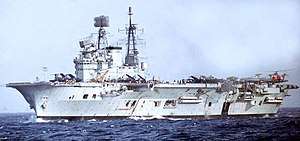Western Fleet (United Kingdom)
The Western Fleet was a fleet of the Royal Navy from June 1967 to 1971.
| Western Fleet | |
|---|---|
 The aircraft carrier HMS Eagle, Flagship of the Western Fleet | |
| Active | 5 June 1967 – November 1971 |
| Country | |
| Branch | |
| Type | Fleet |
| Part of | Admiralty |
| Garrison/HQ | Northwood Headquarters, Middlesex |
History
In 1967 the Home and Mediterranean Fleets were merged to form the Western Fleet.[1] The amalgamated fleet was now responsible for United Kingdom home waters, the North and South Atlantic, and the Mediterranean - all Royal Navy operations “West of Suez”. One of the fleet commander's subordinates was Flag Officer Flotillas, Western Fleet, which Vice Admiral Andrew Lewis filled in 1968–69.[2]
Some details of squadrons in the Western Fleet from 1967 to 1971 can be seen in Graham Watson's work.[3]
In July 1969 fourteen ships of the Western Fleet took part in a Fleet Review and Queen's Colour presentation aboard HMS Eagle in Torbay.
The headquarters of the Western Fleet was at the Northwood Headquarters in Middlesex. The post of Commander in Chief Western Fleet (abbreviated CINC WF) came with the additional NATO responsibility as Commander in Chief Allied Command Channel. The first Allied Commander-in-Chief Channel was Admiral Sir Arthur Power who was also Commander-in-Chief, Portsmouth, appointed in February 1952. In 1966 it was agreed that the same commander, the Royal Navy's Commander-in-Chief, Western Fleet, should direct the NATO Channel and Eastern Atlantic Commands.[4] As a consequence these functions were combined at his Headquarters in Northwood.
The fleet's existence was quite short in comparison to other fleets of the Royal Navy. The Western Fleet was amalgamated with the Far East Fleet in 1971, and the admiral commanding all the Royal Navy's worldwide forces at Northwood was given the title Commander-in-Chief Fleet (CINCFLEET).
Commanders in Chief Western Fleet
Post holders included:[5]
| Rank | Flag | Name | Term | |
|---|---|---|---|---|
| Commander-in-Chief, Western Fleet | ||||
| 1 | Admiral | Sir John Bush | October 1967 – February 1970 | |
| 2 | Admiral | Sir William O’Brien | February 1970 – September 1971 | |
| 3 | Admiral | Sir Edward B. Ashmore | September 1971 – November 1971 | |
The fleet's last commander, Admiral Sir Edward Ashmore, became the first Commander-in-Chief Fleet.
Chiefs of Staff, Western Fleet
Post holders included:[6]
| Rank | Flag | Name | Term | |
|---|---|---|---|---|
| Chief of Staff, Western Fleet | ||||
| 1 | Rear-Admiral | Edmund N. Poland | October 1967 – December 1967 | |
| 2 | Rear-Admiral | Peter W.B. Ashmore | December 1967 – December 1969 | |
| 3 | Rear-Admiral | Ian W. Jamieson | December 1969 – October 1971 | |
| 4 | Vice-Admiral | John Ernle Pope | October 1971 -November 1971 | |
References
- Roberts, John (2009). Safeguarding the Nation: The Story of the Modern Royal Navy. Barnsley, England: Seaforth Publishing. p. 62. ISBN 9781848320437.; Royal Navy (Command System) Hansard, 5 June 1967
- HMS Hampshire (D06), HMS Hampshire 1967–1969 (cruise book), accessed January 2009
- Watson, www.naval-history.net/xGW-RNOrganisation1947-2013.htm.
- AMCCHQ Northwood, History of SNMMG1 (formerly MCMFORNORTH), accessed 29 May 2008
- Whitaker's Almanacks 1967 – 1971
- Mackie, Colin (August 2018). "Royal Navy Senior Appointments from 1865" (PDF). gulabin. C. Mackie. Retrieved 28 August 2018.